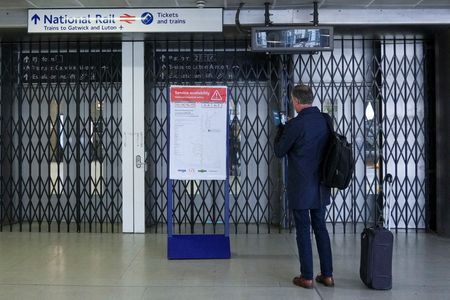By Andy Bruce
LONDON (Reuters) – Average pay for British public sector workers fell to a 19-year low in October, after adjusting for inflation, according to official data on Tuesday that underscored why so many are going on strike.
Workers in both the public and private sectors have walked out in recent months. Rail workers, teachers, postal staff and criminal defence lawyers have all complained that their pay has not kept up with inflation, which hit a 41-year high of 11.1% in October.
While some smaller, mostly private sector disputes have been resolved, the government has so far refused to budge on public sector pay and is instead looking to tighten laws to make it harder for workers in key sectors to strike.
At first glance, public sector pay is rising and reached an average of 607 pounds ($754) a week before tax in October.
But adjusted for consumer price inflation, this is no higher than the 364 pounds a week the average public sector worker earned in October 2003 and is 6% lower in real terms than in October 2021.
(GRAPHIC-UK public sector pay falls to 19-year low, adjusted for inflation: https://fingfx.thomsonreuters.com/gfx/polling/zdpxddrxlpx/Pasted%20image%201670941032822.png)
Average weekly pay in the private sector – where workers typically have lower formal qualifications and also have less generous pension arrangements – was 628 pounds a week in October, 4% less than a year ago in real terms.
“Is it any wonder there is industrial unrest in the public sector?” former Bank of England rate-setter Andrew Sentance, now a senior adviser at Cambridge Econometrics, commented on social media following Tuesday’s wages data.
The government says the pay rises being demanded are unaffordable and that raising pay to match inflation would only prolong the problem.
Bank of England Governor Andrew Bailey reiterated on Tuesday his view that companies would be “sensible” to target pay rises on those at the bottom end of pay scales.
The ONS said 417,000 working days were lost to strikes in October, the highest since November 2011 when just under one million days were lost due to public sector workers walking out in a row over pension reforms.
More than 40,000 railway workers began their latest round of walkouts on Tuesday in a long-running dispute over pay and conditions, causing widespread disruption to Britain’s transport network.
Strikes are due to take place nearly every day in December, with nurses set to walk out on Thursday for the first time in their union’s history.
($1 = 0.8051 pounds)
(Reporting by Andy Bruce; Editing by Gareth Jones)

